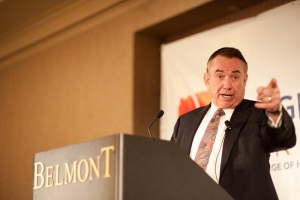Article from Nashville Medical News
Politics in Play
 Tommy Thompson, four-term Governor of Wisconsin and former Secretary of the U. S. Department of Health and Human Services, recently painted a scenario of political intrigue filled with back room bargaining and deal-making worthy of the latest political best seller. However, he wasn’t speaking of a fictional thriller but of the real life maneuvers that will be necessary to get a healthcare reform bill out of Congress.
Tommy Thompson, four-term Governor of Wisconsin and former Secretary of the U. S. Department of Health and Human Services, recently painted a scenario of political intrigue filled with back room bargaining and deal-making worthy of the latest political best seller. However, he wasn’t speaking of a fictional thriller but of the real life maneuvers that will be necessary to get a healthcare reform bill out of Congress.
Speaking at Belmont University a week before Thanksgiving, he predicted that Congress would pass a new, comprehensive healthcare bill, but not without some Congressional arm twisting, “and a lot of shootouts and deal cutting” before reaching a “cantankerous” compromise.
“The president wants the healthcare bill out. Nancy Pelosi wants it out. Harry Reid wants it out,” he explained, of the push to move quickly. Thompson added that, for Democrats, the specter of “what happened in 1994 with the Clintons’ attempt at healthcare reform hangs over their heads.”
The briefing, part of Belmont University’s continuing speaker series, Diagnosing Our Future, was held at the university’s Gordon E. Inman Center.
Sponsored by Medical Reimbursements of America, the primary organizer, the Nashville Health Care Council, Clayton Associates and the Gordon E. Inman College of Health Sciences and Nursing, the briefing was open to the public, as well as Belmont students, faculty and administration officials.
Stuart McWhorter, cofounder of Medical Reimbursements of America, said “Tommy Thompson brings a unique insider perspective to the healthcare debate. He played an instrumental role in the passage and implementation of Medicare Part D, one of the most recent major expansions of healthcare coverage.”
An engaging and lively speaker who has been outspoken on healthcare issues, Thompson put the current debate in the context of recent congressional history and explained the positions and politics of the key players on both sides of the argument.
“Basically, everybody agrees on 80 percent of the proposed changes,” he explained, describing a consensus on most of the proposals to revamp the healthcare system in this country.
He suggested that most Americans also support proposed innovations such as shifting emphasis to wellness systems that encourage exercise and healthy behaviors like smoking cessation; an upgrade in information technology and support of the use of electronic medical records to increase accuracy and communication; and changes in insurance laws to prevent discrimination and unfair denial of coverage.
“The controversy is really about only 20 percent of the proposed reform,” he added, pointing out that the areas of disagreement center on funding by public option, liability reform and government funding for abortion procedures.
There is also controversy about suggestions to tax “Cadillac” healthcare plans to help pay for Medicare. Thompson expects that the final plan will include increased taxes on Americans who earn more than $200,000 annually, as well as on those premium healthcare plans that cost more than $8,000 for individuals or $21,000 for a family of four.
In predicting a timeline, he suggested that once passed, the plan would be phased in and would be fully implemented by 2013.
He said, “Whether or not you like the taxes; whether or not you like the public plan; overall there is going to be a complete transformation of healthcare in this country.”
Thompson suggested that neither the House nor Senate would agree on the bills that each has passed and that the reconciliation process in the Conference Committee would be contentious and pressured by the president’s timeline to get the legislation completed.
He envisioned a scenario where President Obama and his chief-of-staff Rahm Emanuel would schedule White House meetings with recalcitrant Democratic Senators and Congressmen to encourage their support of the joint bill that comes out of the Conference Committee.
He predicted that Emanuel would strongly suggest that any undecided members get on board with the plan and then usher them into the Oval Office where “the president won’t hesitate to remind them of upcoming mid-term Congressional elections and the importance of the healthcare reform to their re-election campaigns,” Thompson suggested.
“Guess what?” he concluded, “They are going to have the votes and they are going to pass healthcare reform.”
